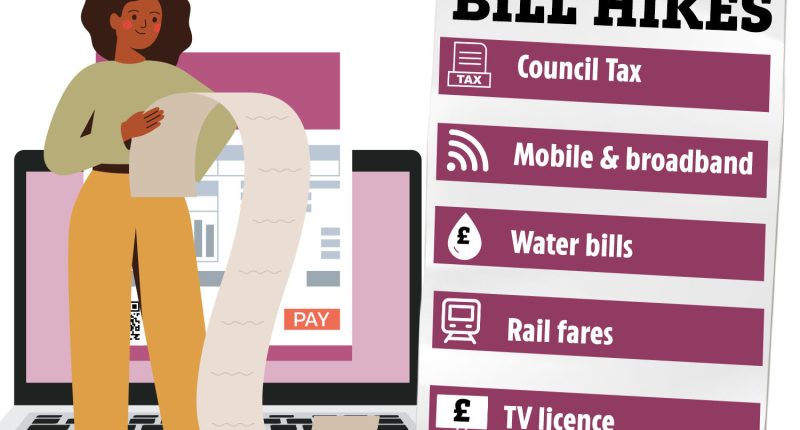HOUSEHOLDS will be facing a barrage of bill hikes in the coming weeks but there are ways to avoid paying more.
With the next tax year starting in April, many price increases will kick in soon and bill payers need to be prepared.
But with the help of a few clever tricks, you can keep costs down.
Energy, water, home insurance, motor insurance, and council tax are all set to rise.
Just days ago, it was revealed that water bills will rise by up to £71 for millions in April.
The total annual cost for regular household bills is now approximately £5,589, up from £5,263 last year, according to Compare the Market.
READ MORE IN MONEY
Each bill will rise by a different amount and on different dates.
We’ve made a handy list so you can keep track of everything that’s happening in the coming months.
1. Rail fares – March 3
Rail fares are set to rise again in March, although not by using the usual formula based on July’s Retail Prices Index (RPI), which was 9%.
Fares will instead be hiked by 4.9% next year, the Department for Transport has announced.
Most read in Money
The rise will affect season tickets on most commuter journeys, some off-peak return tickets on long-distance journeys, and flexible tickets for travel around major cities.
The current cost of a weekly commute from Oxford to London is £6,096, which will rise to £6,394 from March next year – £298 more.
Meanwhile, a season ticket from Tunbridge Wells to London will rise by £372 to £5,829.
What can I do about it?
Regular passengers may be able to cut the cost of standard anytime, off-peak, advance and first-class advance tickets by up to a third with a railcard.
You can buy these through National Rail but you’ll need to pay a fee.
That said, if you regularly travel by train, you’ll make up this cost in no time.
Cards for those aged 16-25 cost £30 a year, or £70 for a three-year card.
Don’t pay over the odds for tickets and remember to compare prices before you buy.
Ticket firms usually start selling fares around 12 weeks in advance.
This is when Network Rail releases its timetable.
The earlier you book, the less you’ll pay for your seat so get organised if you know you’re going to be travelling over the next few months.
First, check the National Rail website, which is a great way to get an overview of routes and travel times.
Then check the train operating companies’ website or Trainline to see if cheaper fares are available.
You can sign up to the Trainline’s ticket alert service and it will tell you when cheap advance tickets go on sale for a particular journey.
But sites like Trainline will usually charge you to make a booking — between 25p and £1.50 — so factor that into your savings.
If you’re taking a lengthy train journey then you could save hundreds of pounds by splitting your tickets.
You won’t need to change trains and National Rail lets you split your ticket as long as the train calls at the station you buy the tickets for.
One site that works this out for you is Splitticketing.co.uk.
2. Water bills – April 1
The average household water and sewerage bill in England and Wales will rise by 6% or about £27 to £473 a year from April 1.
This is an average rise of £71 a year.
Wessex Water and Anglian Water are at the top end of the scale, with average bills set to increase to £548 and £529 respectively.
Meanwhile, Northumbrian customers will see the lowest average bills of £422.
Water UK said bills were rising less than in the previous financial year and argued that they would be around £60 higher today if they had kept pace with inflation since 2014.
Water UK said the funds raised by increased water bills were guaranteed only to fund improvements in water and sewerage systems, and the regulator would automatically reduce bills if they were not delivered.
What can I do about it?
Moving to a water meter could help some save some extra cash.
One mum more than halved her water bill after getting a meter – saving over £200 a year.
Obviously, if you do use a lot of water then it makes no sense to have a meter as your bills could go UP.
The Consumer Council for Water offers a free water meter calculator that’ll tell you if you can save by fitting a water meter.
For example, if you have a big family and more people than bedrooms or simply use lots of water-intensive appliances like washing machines or dishwashers, a fixed fee will be better for you.
Having a water meter doesn’t help with the standard charge that’s based on where you live either, but it can help you cut down the costs of your personal usage at home.
Part of that is how long you spend in the shower too.
According to Uswitch you could cut £70 from your energy bills and reduce your water bills too by reducing your wash time.
And leaving the water running while you brush your teeth could add £60 a year to your bills says Octopus.
The same goes for washing dishes, be sure you turn the tap off as if you’re doing it in the sink, leaving it running will add £25 to your annual bill.
Many water companies offer free water-saving devices that shave pounds off your bills too.
Contact your supplier or check out savewatersavemoney.co.uk.
3. Council tax rises – April
Every year, councils decide how much to increase council tax bills by.
Of course, the amount your bill will rise by is still being decided.
Confirmation of rises is usually shared at the beginning of the new financial year in April.
The average cost for Band D properties in England is £2,065.
If the government allows local authorities to increase council tax by 5%, this will rise by £103.25 to £2168.25.
What can I do about it?
People on low incomes or benefits such as Universal Credit may be able to get a discount on their council tax.
This can vary between councils, but you could be exempt from paying any council tax at all.
The schemes are means-tested, and will usually depend on your income and any children or adults living with you.
Single adults living in a property can get a 25% discount on their bill.
This is for people of all incomes and applies if they are the only adult living in the property.
The discount also applies if they live with a young person aged under 18, or someone aged 18 or 19 in full-time education.
A reduction could also be applied if there is a disabled person living in the property.
This is known as a disabled person’s reduction and each council has its own criteria.
You may also get 50% off your council tax if you live with someone who is severely mentally impaired.
4. Broadband and mobile – April 1
Many of the biggest broadband firms – such as BT, EE, Plusnet, Shell Energy, TalkTalk, Virgin Media and Vodafone – raise prices every April in line with the Consumer Price Index (CPI) or the Retail Price Index (RPI) plus an additional 3.9%.
December CPI inflation or January Retail Price Index (RPI) is normally used to decide these rises.
This means that broadband bills could rise by 7.9% in April because December’s CPI stood at 4%.
Uswitch calculated that the increase could cost the individual consumer around £27.19 more a year for broadband and £24.23 for mobile bills on average.
These rises also impact those who are within a contract, and they kick in from April 1 usually.
BT, EE and Three are among the firms which have confirmed to The Sun they will put up bills by up to 7.9%
The majority of Sky Mobile’s phone tariffs will soon increase, so you likely will see a rise.
From February 14, bills for Sky’s the average out-of-contract customer will see their monthly bill go up by 3%.
What can I do about it?
Switching contracts when yours is up is the single best way to save money on your telecom bills.
In the weeks before your contract is up, use comparison sites to familiarise yourself with what deals are available.
It’s a known fact that new customers always get the best deals.
Sites like MoneySuperMarket and Uswitch all help you customise your search based on price, speed and provider.
This should make it easier to decide whether to renew your contract or move to another provider.
However, if you do not want to switch and are happy with the service you’re getting under your current provider – haggle for a better deal.
You can still make significant savings by renewing your contract rather than rolling on to the tariff you’re given after your deal.
You could save up to £210 a year on your bills by haggling alone.
If you need to speak to a company on the phone, be sure to catch them at the right time.
Make some time to negotiate with your provider in the morning.
This way, you have a better chance of being the first customer through on the phone, and the rep won’t have worked tirelessly through previous calls which may have affected their stress levels.
It pays to be polite when getting through to someone on the phone, as representatives are less inclined to help rude or aggressive customers.
Knowing what other offers are on the market can help you to make a case for yourself to your provider.
If your provider won’t haggle, you can always threaten to leave.
Companies don’t want to lose customers and may come up with a last-minute offer to keep you.
Last but not least, it’s worth investigating social tariffs.
These broadband packages and discounts have been created for people who are receiving certain benefits.
They’re often available to those on income support, Universal Credit, or disability allowance.
Around 4.2million households are eligible for these cheaper tariffs but only 55,000 are making use of them.
Prices start from £12.50 a month, so ask your provider what’s on offer.
5. TV licence price increase – April 1
Households will be paying more for their TV licence fee from next year.
For the past two years, the licence fee has been frozen at the price of £159 but that is set to change.
It was expected that an increase was on the horizon as it was previously agreed the fee would rise in line with inflation after April 2024.
This has since been confirmed and the BBC licence fee will rise from £159 to £169.50, as of April 1 – an increase of £10.50.
What can I do about it?
Everyone who watches TV in the UK needs to pay their annual licence fee, which counts for any live TV or anything on BBC iPlayer on any device.
If you don’t have one it’s a criminal offence and you could be landed with a fine of £1,000.
But if you’re on Pension Credit and over the age of 75, you might be exempt, meaning you could save £159 a year.
Pension Credit is a benefit designed to boost incomes, but it’s estimated millions are entitled to it and don’t claim it.
That means many are missing out on the free TV licence and other help too.
Similarly, if you or someone you live with is in any way visually impaired, they may be entitled to a 50% discount.
If you live in a residential care home or sheltered accommodation, you may be able to apply for a reduced licence which will normally cost you £7.50 instead.
Plus if you’re a student you could be covered by your parents’ licence even if you live away from home – but you shouldn’t watch on a device plugged into the mains in this case.
READ MORE SUN STORIES
Meanwhile, here are 17 big money changes coming in this year and what they mean for YOU.
Plus, six major pension changes you need to know about.
Do you have a money problem that needs sorting? Get in touch by emailing [email protected].
Plus, you can join our Sun Money Chats and Tips Facebook group to share your tips and stories.










